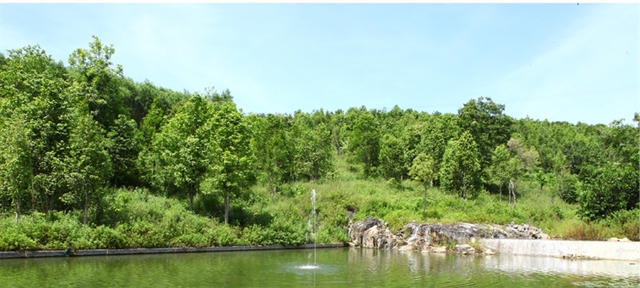 Sunday/Weekend
Sunday/Weekend

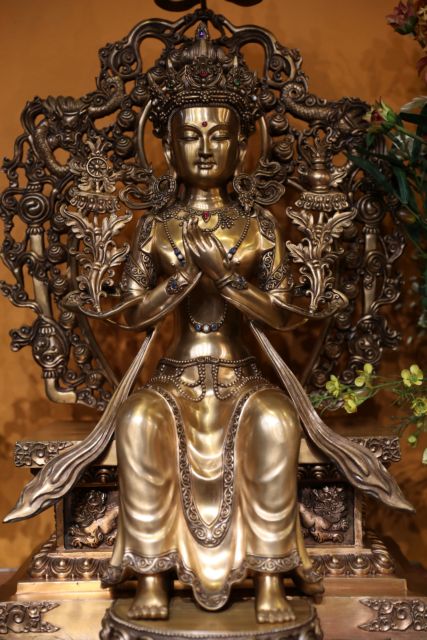 |
| A product of artisan Bùi Thị Minh’s family workshop — VNS Photo Đoàn Tùng |
By Thanh Nga
Bronze casting at Ngũ Xã Village is one of the four elite professions of the royal capital city of Thăng Long, now Hà Nội. However, in modern time of industrialisation, craftsmen are facing challenges in preserving the essence of their craft.
For centuries, numerous renowned craft villages have thrived along the banks of the city's West Lake. In the 1500s, skilled bronze-casting craftsmen migrated to Thăng Long and established a casting workshop. This workshop eventually expanded to encompass five neighbouring villages, which collectively adopted the name Ngũ Xã, meaning "five villages".
Ngũ Xã Village earlier boasted over 20 workshops of many families from four clans – Nguyễn, Lê, Đỗ, and Trần, each occupying a sizable area and housing one or two furnaces. They produced a wide range of items, including pots, trays, vases, as well as bells, statues, candleholders incense burners, and other altar items.
The village is now situated by Trúc Bạch Lake in Ba Đình District, Hà Nội. The bronze bells and statues crafted by local artisans have gained widespread acclaim. Bronze bells from the village can be found in numerous pagodas and temples across the country.
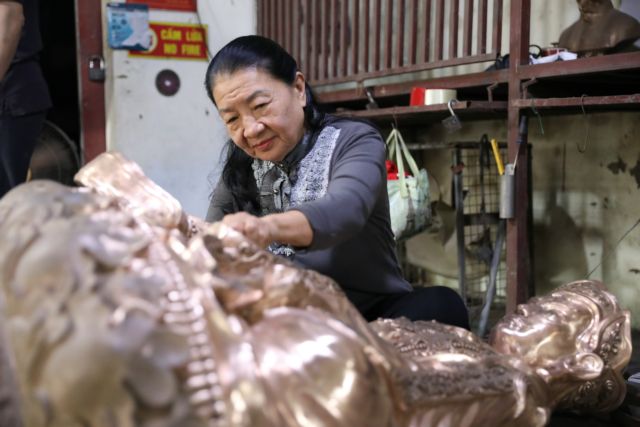 |
| Artisan Bùi Thị Minh has nearly five decades of dedication to bronze casting, alongside her husband and children. — VNS Photo Đoàn Tùng |
Notable examples of the villagers' craftsmanship include the bell in the Một Cột (One-Pillar) Pagoda and the bronze statue of Huyền Thiên Trấn Vũ in Quán Thánh Temple, which stands nearly 4m tall and weighs 4 tonnes. These statues exemplify the talent, unique technique and creativity of Ngũ Xá artisans.
Additionally, Thần Quang Pagoda houses a 4m-tall and 12.3-tonne bronze statue of Amitabha Buddha, created between 1949 and 1952. It is recognised as the oldest bronze Buddha statue in the country.
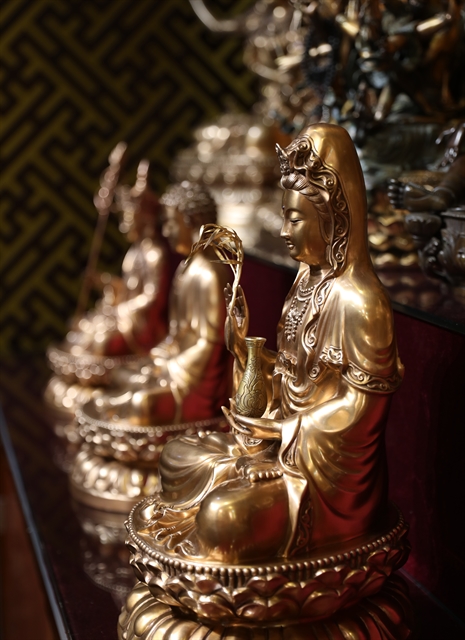 |
| Artisan Bùi Thị Minh’s workshop specialises in producing traditional altar items. — VNS Photo Đoàn Tùng |
Over the past 500 years, Ngũ Xá bronze casting has evolved into magnificent masterpieces of national art. However, enduring various challenges, only one family-run bronze-casting workshop remains operating in the village, which belongs to Nguyễn Văn Ứng, a master artisan, and his wife, artisan Bùi Thị Minh. Their workshop specialises in producing traditional altar items.
"My father-in-law was a renowned artisan in the village. When I arrived here, I witnessed the decline of this craft, which greatly concerned me. I felt a deep connection to the unique art of bronze casting and desired to follow this job," Minh told Việt Nam News.
"I truly resonate with what my father-in-law once said: 'If you create a product that you feel reluctant to sell, then you should pursue this profession. But if your sole motivation is to make money to buy rice, then you should reconsider carefully.'"
Minh believes that each of her creations is an enduring work of art, representing the tradition and identity of the Ngũ Xá bronze casting craft. A meticulously crafted Buddha statue possesses a captivating aura that can inspire people to embrace goodness, perform acts of kindness, and shun evil. This embodies the inherent value of Vietnamese spiritual culture.
 |
| Artisan Nguyễn Thanh Tuấn is passionate about his work. — VNS Photo Đoàn Tùng |
 |
| A worker is polishing the lid of a bronze incense burner. — VNS Photo Đoàn Tùng |
Throughout history, Minh's family has weathered the storms of the market economy. Over nearly five decades of dedication, alongside her husband and children, Minh has amassed a wealth of experience and produced numerous trusted products, preserving the traditions passed down by their ancestors.
"I am deeply honoured that my entire family of five pursues this profession and has been bestowed with the title of 'Hà Nội Artisan'. It is a weighty responsibility that compels us to safeguard and promote the artistic value and quintessence of our nation," Minh said.
According to Minh's son, Nguyễn Thanh Tuấn, creating flawless and intricate products is an art that draws upon diverse knowledge encompassing culture, religion, painting, technology, and, most importantly, the craftsman's mindset.
"Bronze casting is not inherently difficult, but it demands meticulous research, diligence, skill, and attentiveness to imbue the works with their own soul and spirit," Tuấn said.
"The process of crafting a product involves shaping, moulding, casting, curing, carving, and finishing. Each step is crucial and must be executed precisely. However, to achieve delicacy and soulfulness, the curing step is of paramount importance."
Tuấn explained that traditional Ngũ Xá bronze products are renowned for their monolithic casting and colouring methods, which are predominantly done by hand.
Inheriting the family's secret techniques, Minh's workshop has gained a reputation for crafting high-quality bronze casting products. With several 4-star "One Commune One Product" items and numerous domestic awards, Minh's family has successfully carried on the tradition and fostered the growth of the bronze-casting craft village.
"I truly resonate with what my father-in-law once said: 'If you create a product that you feel reluctant to sell, then you should pursue this profession. But if your sole motivation is to make money to buy rice, then you should reconsider carefully.'"
The workshop provides employment opportunities for about 20 workers, all of whom receive comprehensive training and guidance from the outset.
Vũ Thị Đương, 43, has worked at the workshop for over a decade, said: "I hail from Đồng Xâm silver carving village in Thái Bình Province. I had some prior experience in silver carving, so transitioning to bronze carving wasn't too challenging. I feel proud to contribute to the preservation of our ancestral craft."
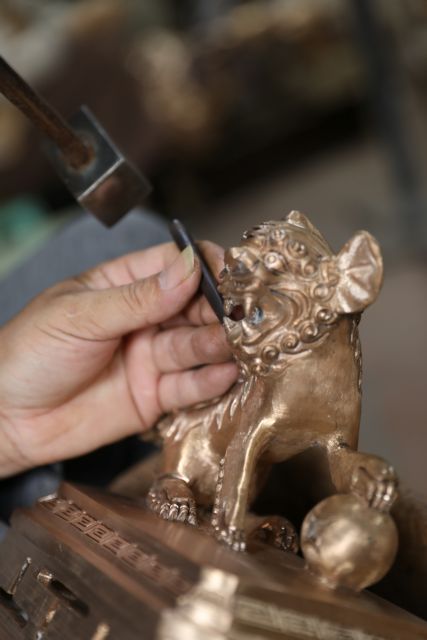 |
| Ngũ Xã bronze casting is considered one of the four elite professions of the ancient capital of Thăng Long. — VNS Photo Đoàn Tùng |
Minh's workshop remains bustling with daily orders. However, she continues to harbour concerns about the potential loss of the ancient craft of bronze casting as young workers become increasingly scarce and the artisans themselves grow older.
"I truly desire to preserve this workshop, transforming it into a tourist attraction. I also earnestly hope that the authorities will support us in securing a space to impart the essence of bronze casting to future generations," Minh said. VNS




